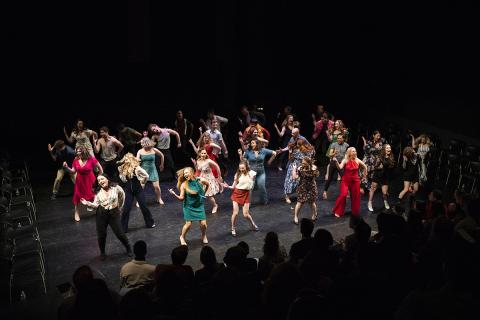New Graduate Program, Minutes from Broadway, Prepares Students for Musical Theater's Future

Image by Ryan Nava
The backbone of any great piece of musical theater is a good storyline, and, increasingly, the most dazzling shows use the latest technology to help bring their plots to life. At Berklee’s new graduate Writing and Design for Musical Theater program, in New York City, students learn both sides of what makes an innovative production, whether for the stage or for film, television, and video games.
Rona Siddiqui
“Primarily, the program is a fusion of the creation process with technology,” says Rona Siddiqui, its director. “We will teach students how to write musicals, how to tell a great story through this form, and then how [to] use technology and collaborate with designers to make that come to fruition.”
The yearlong curriculum is part of Berklee NYC’s trio of Master of Arts in Creative Media and Technology degree specializations, which also include live experience design, led by Loudon Stearns, and songwriting and production, headed by Will Wells. All three courses of study start in fall 2021 and are accepting applications.
A Comprehensive Method
The writing and design for musical theater specialization is unique in its approach. Unlike many programs that focus on writing, Berklee NYC’s program equips students with a broader skill set, including character development, songwriting, cast-recording production, bookwriting, and theatrical visual environment conception, but also technical expertise across industry-standard software and hardware, such as Logic, Ableton, and Pro Tools, and know-how in design and staging techniques.
The Berklee NYC program is a counterpart of sorts to the Boston Conservatory at Berklee’s master’s degree program in musical theater, and Berklee College of Music’s minor in musical theater, both of which focus on performance, not production. The introduction of the new program into this ecosystem will enhance students’ experience in all three courses of study as they build collaborative opportunities between the Boston and NYC campuses.
Off Broadway
One of the program’s biggest advantages is its location. Based just blocks away from Broadway, Berklee NYC offers students unparalleled access to the world’s musical theater mecca. Not only will students be able to see as much theater as possible, they will meet the people behind the productions.
“We will create liaisons with the shows and then will constantly have the working professionals coming in and talking to the students,” Siddiqui, herself a member of the city’s musical theater world, says. She envisions daily workshops and seminars with Broadway’s writers, designers, producers, and others.
“I want (students) to find their voice, their sound, and then just max it out.”
—Rona Siddiqui
Both these interactions and the proximity to Broadway naturally leads to rich networking opportunities. “Maybe you met somebody on campus and then you email them and say, ‘Hey, I’d love to grab a bubble tea with you,’ and those conversations are easy to have,” she says. “You walk down the street in Midtown and you are constantly running into people [who work in musical theater]. And everybody’s so accessible. People love to talk shop and many are happy to nurture the next generation.”
Being in New York City also means that Siddiqui is enjoying “an embarrassment of riches” as she hires faculty for the fall. In addition to looking at accomplished musicians and writers to teach, she says that Berklee NYC board members Alex Lacamoire B.M. ’95, ’19H (Hamilton) and Stephen Oremus B.M. ’92 (Book of Mormon) have said they’d like to participate in the program.
New Directions
Once students graduate from the program, they will be prepared to take their careers in any direction musical theater can be found. “If they’re interested in orchestrating and arranging, they should be able to walk out and do that; if they are interested in music directing, they should get a lot of experience all year long,” Siddiqui says.
Though the stage is the traditional venue for musical theater, more and more it’s showing up in television, film, web series, and video games. Glee may have been one of the first big TV shows to showcase musical theater, but it regularly appears on late-night shows and other variety programs. One example Siddiqui points to is The Amber Ruffin Show, in which there’s a musical number in nearly every episode.
But whichever path a student decides to take, Siddiqui hopes they will feel empowered to create new directions within the form: “I want them to find their voice, their sound, and then just max it out.”
